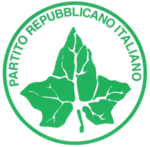Partito Repubblicato Italiano
|
Italian Republican Party
Partito Repubblicano Italiano |
|
|---|---|
 |
|
| Secretary | vacant |
| President | Francesco Nucara |
| Coordinator of the Secretariat |
Corrado De Rinaldis Saponaro (acting secretary) |
| Founded | 21 April 1895 |
| Headquarters | corso Vittorio Emanuele II, 326 – 00186 Rome |
| Newspaper | La Voce Repubblicana |
| Membership (2005) | 12,000 max: 108,589 (1978) |
| Ideology | 1895–1946: Radicalism Republicanism Anti-clericalism Present: Liberalism Social liberalism |
| Political position | 1895–1946: Left-wing to Centre-left 1946–present: Centre |
| National affiliation |
Centrism (1948–58) Organic Centre-left (1962–76) Pentapartito (1980–1992) Pact for Italy (1994) L'Ulivo (1996–2000) Forza Italia (2000–2009) European Choice (2014) |
| European affiliation | European Liberal Democrat and Reform Party (1976–2010) |
| International affiliation | none |
| European Parliament group | ELDR group (1979–2004) |
| Colours | Green |
| Chamber of Deputies |
0 / 630
|
| Senate |
0 / 315
|
| European Parliament |
0 / 73
|
| Website | |
| Official website | |
The Italian Republican Party (Italian: Partito Repubblicano Italiano, PRI) is a liberal and social-liberalpolitical party in Italy. The PRI is a party with old roots that began with a left-wing position, claiming descent from the political thought of Giuseppe Mazzini. The early party was also known for its anti-clerical and anti-fascist roots.
The PRI was a member of the European Liberal Democrat and Reform Party (ELDR) until 2010 and, while not being among its members, sports the logos of the Alliance of Liberals and Democrats for Europe Party (ELDR's successor) and the Alliance of Liberals and Democrats for Europe Group in its website and member card, respectively.
The Italian Republican Party (PRI) traces its origins from the time of Italian unification and, more specifically, to the democratic-republican wing represented by figures such as Giuseppe Mazzini, Carlo Cattaneo and Carlo Pisacane. They were against the so-called piemontesizzazione of Italy, meaning the conquest by war of the Kingdom of Sardinia (Piedmont) of the rest of Italy. After the latter was unified under the Savoy kings, following the political lines of moderates such as Camillo Benso di Cavour, the Republicans remained aside from the political life of the new country, proclaiming their abstention from elections. They however created several democratic movements.
...
Wikipedia
